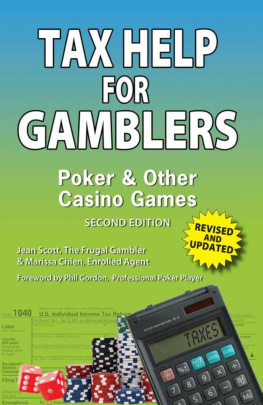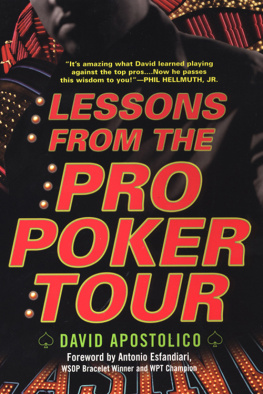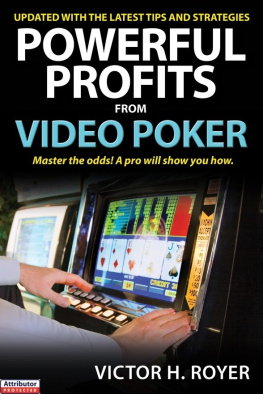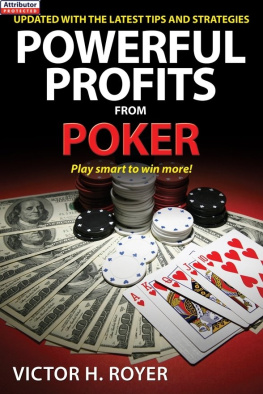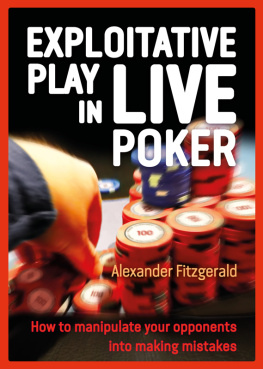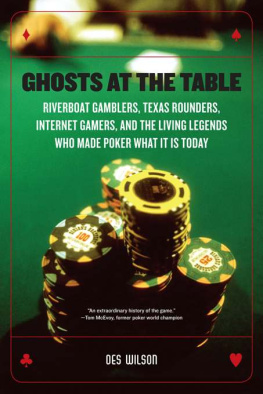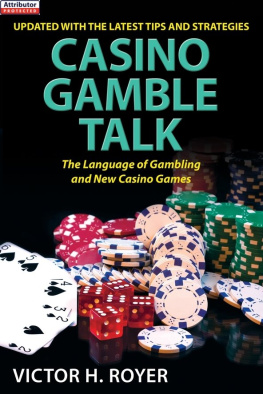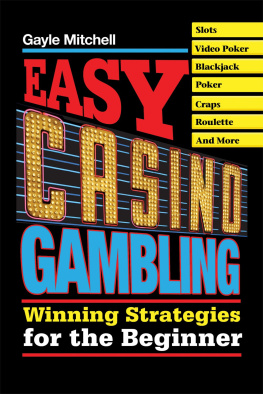Other Books
by Jean Scott
The Frugal Gambler
More Frugal Gambling
Frugal Video Poker
Frugal Video Poker Scouting Guide
Tax Help
for Gamblers
Tax Help
for Gamblers
Poker & Other
Casino Games
Second Edition
Jean Scott, The Frugal Gambler
& Marissa Chien, Enrolled Agent
Foreword by Phil Gordon,
Professional Poker Player

Tax Help for Gamblers
Poker & Other Casino Games
Second Edition
Published by
Huntington Press
3665 Procyon St.
Las Vegas, Nevada 89103
telephone: (702) 252-0655
facsimile: (702) 252-0675
email:
Copyright 2012, Jean Scott, Marissa Chien, EA
First Edition 2007
ISBN: 978-1-935396-92-5
$9.98us
Design & production: Laurie Cabot
Cover Images: Poker chips Matthew Benoit/Dreamstime.com; calculator Irina Vikhrova/Dreamstime.com
DISCLAIMER
The information presented in this book is intended as no more than a general guideline for the general public. Tax issues surrounding gambling can be extremely complicated and ultimately depends upon the facts and circumstances of each individual taxpayer. Although the authors and the publisher have made every effort to ensure the accuracy of this information, its imperative that taxpaying gamblers consult with tax advisors regarding personal situation.
All rights reserved. No part of this publication may be translated, reproduced, or transmitted in any form or by any means, electronic or mechanical, including photocopying and recording, or by any information storage and retrieval system, without the express written permission of the copyright owner.
Contents
Foreword
by Phil Gordon
When I met Marissa Chien about seven years ago, my financial life was a mess. Like many professional gamblers, I had neglected many of my financial responsibilities. Being a winner makes that easy to do. The money just seems to roll in and theres always enough to cover whatever tournament buy-ins are required and whatever expenses are necessary.
Ive been a professional poker player now for about 12 years. Knock on wood, Ive never had a losing year. Not everyone can run so good for so long. By my estimates, about 80% of the professional players you see on TV on a regular basis have been broke or are currently broke. It happens. This is a risky business. And at the end of the day, every dime you can save on taxes is a dime that mitigates your risk of going broke. Its saving bets that counts the most over the long term, not only in gambling, but also with the IRS.
Take my advice: Get on board with a solid accounting plan. You may not be able to use Marissa as your personal accountant like Im fortunate enough to do. But you can use the solid information in this book, available nowhere else as far as I know, to stay square with the taxman, neither underpaying nor overpaying what you owe on your gambling winnings.
I used to absolutely dread April 15. Now its just another day when I can go down to the casino and win some money and build my bankroll.
Best of luck, and may you be fortunate enough to have to pay some taxes on your gambling winnings year after year.
Phil Gordon, poker professional
Authors Notes
JEAN SCOTT
This Second Edition of Tax Help for Gamblers is the culmination of 10 years of continuing research into the ever-changing tax world for gamblers. Because of the expansion of gambling into so many new areas of the country, there have been advances, as both the IRS and state governments have become more knowledgeable about gambling issues. Yea, I might even say that some have become more sympathetic to gamblers. But its still a very rocky road, just as it was when I first thought about it a decade ago.
Actually, this whole thing began as a single chapter in my earlier book More Frugal Gambling. Due to my own experiences and the many questions casino players asked me, I knew that tax implications connected to gambling were a big mystery to most people, and I began researching the subject. I read as many IRS publications as I could find and searched widely for tax information on the Internet. I talked to present and former IRS agents and to many tax preparers, accountants, and lawyers.
I discovered that the IRS offers surprisingly few details to guide gamblers through the tax maze in which they find themselves. Furthermore, I found what the IRS does say is often general, vague, open to individual interpretation, and even contradictory. This may have been done intentionally, so that most gambling issues would fit under a large umbrella of general guidelines. Or, more likely, its typical government bureaucracy that is slow to keep up with changing times.
Whatever the reason, its difficult for an individual taxpayer to know exactly how to treat his particular gambling circumstances, and it has even ended up confusing the IRS itself. Therefore, you cant call one IRS phone number and get the final and absolute answer to your questions on gambling and federal income taxescalling and talking to 10 different IRS representatives might give you up to 10 varying pieces of advice. Two auditors sitting next to each other in the same office could hear the same information and come up with entirely different results.
In addition, I quickly learned that many tax preparers arent knowledgeable about gambling issues, even if theyre experts in other tax areas. For many years before we moved to Las Vegas, I had to educate my otherwise-excellent accountants about gambling issues, though my own knowledge was extremely limited at the time.
However, when we moved to Vegas, Brad and I were fortunate to find a fellow gambler who was also a tax accountantMarissa Chien. Finally, I had someone who, as a gambler as well as an Enrolled Agent, was knowledgeable about both gambling and taxes and could do our tax returns in such a way that we could be relatively certain that all the bases were covered accurately. Marissa gave me so much valuable input for my tax chapter, which she had kindly offered to edit, that I realized this was a much broader subject than Id originally imagined.
A lightbulb came on in my head: I needed more of Marissas input to cover this subject adequately, and it was definitely too much for one chapter in a book. It needed a whole book to itself, one that Marissa and I should write together. So that is how Tax Help for Gamblers was born.
Weve retained most of the text of the original chapter, written in my folksy laymans style. Marissa went through it and added important information to explain some of the whys and hows of this complex subject, including tax-code specifics, relevant court cases, and professional comments. She also prepared the charts and forms in the section on state taxes and in the Appendix, to help readers better see the practical application of the information we cover.
Although the publisher has put a disclaimer in the front of this book, Marissa and I want to add some cautions here. Im a teacher and a writer by profession, not an accountant or lawyer. Although I try to be clear in differentiating between facts and opinions, I want to emphasize that no one should base his or her actions solely on the information in this book. Even though Marissa is a qualified Enrolled Agent and has more technical knowledge in this area than I do, she strongly concurs. The information here is provided merely to help you become more knowledgeable about some of the thorny issues in this complex field.

